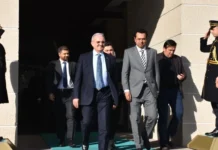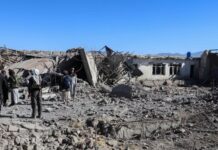ISLAMABAD, Aug1 (Alliance News): Iranian President Dr. Masoud Pezeshkian is scheduled to arrive in Islamabad on Saturday (August 1) for a two-day official visit to Pakistan, marking his first international trip to the country since assuming office earlier this year.
The visit comes at the invitation of Prime Minister Shehbaz Sharif and is expected to further deepen bilateral cooperation across political, economic, and cultural dimensions.
According to a statement issued by the Foreign Office on Friday, President Pezeshkian will be accompanied by a high-level delegation, including Iranian Foreign Minister Seyyed Abbas Araghchi, senior cabinet members, and other senior officials. His visit underscores Iran’s willingness to boost regional ties and advance a broader strategic relationship with Pakistan.
During his stay in Islamabad, the Iranian leader is expected to hold one-on-one and delegation-level talks with Prime Minister Shehbaz Sharif and meet with President Asif Ali Zardari.
Discussions will center on mutual cooperation in trade, border management, regional stability, cultural exchange, and religious harmony. Both nations are also likely to explore fresh opportunities for collaboration in energy, transit, and security.
The visit takes place at a time when both countries are reasserting their diplomatic and trade engagements, aiming to strengthen regional cooperation in the face of common challenges such as terrorism, economic volatility, and external aggression.
President Pezeshkian’s visit is also seen as a continuation of the goodwill generated during Prime Minister Shehbaz Sharif’s recent visit to Tehran in May 2025.
That two-day visit by PM Shehbaz was part of a broader regional tour to thank friendly nations for their support during Pakistan’s conflict with India. During his meetings in Tehran, he held meaningful engagements with Supreme Leader Ayatollah Seyyed Ali Khamenei and the then-President of Iran.
Topics included the promotion of bilateral trade, greater regional connectivity, and mutual cooperation on geopolitical issues, especially the humanitarian crisis in Gaza.
The upcoming meetings between President Pezeshkian and Pakistani leadership are expected to revisit those discussions and develop actionable strategies to accelerate existing commitments, particularly in expanding bilateral trade beyond the current level of $3 billion.
Iranian President’s Political Adviser Mehdi Sanai emphasized in a social media post on July 30 that the visit would also feature interactions with Pakistan’s cultural and business elites.
“The relations between the two countries encompass political, economic, religious, and cultural dimensions,” he noted on X (formerly Twitter), adding that enhancing trade and cross-border cooperation are among the key objectives of the visit.
Observers believe that President Pezeshkian’s trip, which follows in the footsteps of former President Ebrahim Raisi’s historic April 2024 visit, signifies continuity in Iran’s approach to Pakistan. Raisi’s visit, just a month before his tragic death in a helicopter crash, was marked by strategic agreements and a commitment to peace, regional solidarity, and economic cooperation.
President Pezeshkian’s government is now tasked with sustaining the momentum built under his predecessor, particularly in economic and security matters.
In this context, Pakistani analysts view the Iranian president’s visit as an important gesture of reaffirming ties at the highest level and paving the way for more robust mechanisms to facilitate border trade, energy projects, and religious tourism.
Security arrangements for the visit are already in place, with coordination between the Ministry of Interior and intelligence agencies to ensure a smooth and secure visit.
The Iranian delegation is expected to hold talks with Pakistan’s military leadership and other key stakeholders to exchange views on regional security, counter-terrorism cooperation, and trans-border challenges.
One of the central components of the bilateral dialogue will be the Pak-Iran border situation, which has historically seen both cooperation and friction.
Both countries have been actively working on improving border trade infrastructure, managing illegal crossings, and combating cross-border terrorism. This visit is expected to yield agreements or MOUs to enhance coordinated border management and intelligence sharing.
Energy cooperation is another key area under review. With Iran possessing vast natural gas resources, Pakistan continues to look towards projects such as the Iran-Pakistan Gas Pipeline to address its persistent energy shortages. While the project has faced delays due to international sanctions and financial hurdles, renewed discussions at the highest level may give it a fresh push.
Cultural diplomacy is also expected to feature in the visit, with discussions on strengthening people-to-people ties, academic exchanges, and promotion of Persian and Urdu literature. Given the deep historical, religious, and linguistic connections between the two countries, there is broad scope for collaborative ventures in arts, media, and education.
Religious harmony, particularly in the context of Sunni-Shia unity and interfaith dialogue, is likely to be addressed as well. Pakistan, with its significant Shia population, shares religious traditions with Iran, and both nations have a history of promoting Islamic unity.
In the current geopolitical climate, where sectarian divisions are often exploited by foreign interests, both countries are expected to reaffirm their commitment to religious harmony and intra-faith solidarity.
The Iranian President’s itinerary is expected to include visits to key cultural and diplomatic sites, as well as a meeting with Pakistani business leaders to explore avenues for trade and investment.
The Foreign Office has confirmed that a joint communiqué is likely to be issued following the conclusion of the visit, summarizing the key understandings reached between the two governments.
This high-level engagement is being closely watched by regional players and international observers alike, especially as both Iran and Pakistan seek to play more assertive roles in shaping the future of South and West Asia.
The visit also sends a strong signal to adversaries that the two countries stand united on matters of mutual interest, including defense of sovereignty, regional peace, and economic resilience.
In addition to bilateral matters, both leaders are also likely to discuss developments in Palestine and express solidarity with the people of Gaza.
Pakistan and Iran have been vocal opponents of the ongoing Zionist aggression, and their joint statements are expected to call for an immediate ceasefire and humanitarian access to the besieged population.
As President Masoud Pezeshkian embarks on this pivotal visit to Islamabad, expectations are high that it will not only reaffirm the brotherly relations between Iran and Pakistan but also produce tangible outcomes in trade, energy, cultural cooperation, and regional diplomacy. With both countries facing similar geopolitical pressures and domestic challenges, mutual understanding and cooperation are more important than ever before.






